Qualitative Investigation: Digital Tech Impact on Hospitality Business
VerifiedAdded on 2022/12/26
|33
|6705
|2
Report
AI Summary
This report presents a qualitative investigation into the impact of digital technologies on the hospitality business, using Novotel London Canary Wharf as a case study. It explores the range of digital technologies used, their importance, and the challenges faced in implementation. The research includes a literature review covering various digital technologies like automation, chatbots, and digital room keys, and their effects on customer experience and brand awareness. The methodology involves qualitative data collection and analysis to address research questions about the importance of digital technologies, customer awareness strategies, and challenges. The findings analyze the impact of these technologies on profitability and future growth prospects, offering recommendations and conclusions based on the interpretation of results, and suggesting how the hotel can improve its performance by improving its application.
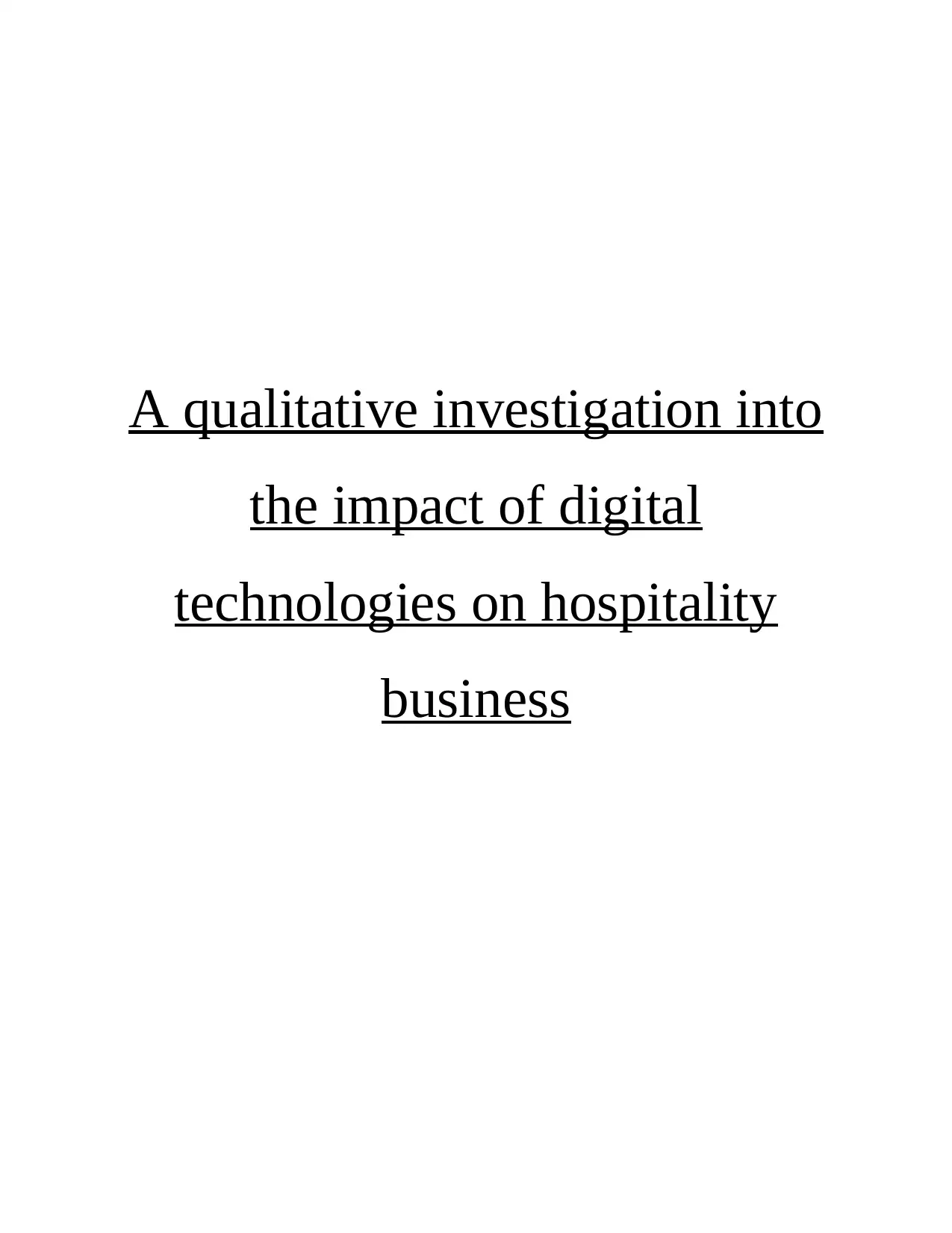
A qualitative investigation into
the impact of digital
technologies on hospitality
business
the impact of digital
technologies on hospitality
business
Paraphrase This Document
Need a fresh take? Get an instant paraphrase of this document with our AI Paraphraser

ACKNOWLEDGEMENT
I would like to express my sincere gratitude to my supervisor and mentor for
providing invaluable guidance and suggestion in the process of completing my research
report. This has helped me in completing this project and making it a full proof success
because of the timely instructions given by them.
I would also like to thank my friends and family for always encouraging me in
meeting with my desired goals on time across the different phases.
I would like to express my sincere gratitude to my supervisor and mentor for
providing invaluable guidance and suggestion in the process of completing my research
report. This has helped me in completing this project and making it a full proof success
because of the timely instructions given by them.
I would also like to thank my friends and family for always encouraging me in
meeting with my desired goals on time across the different phases.
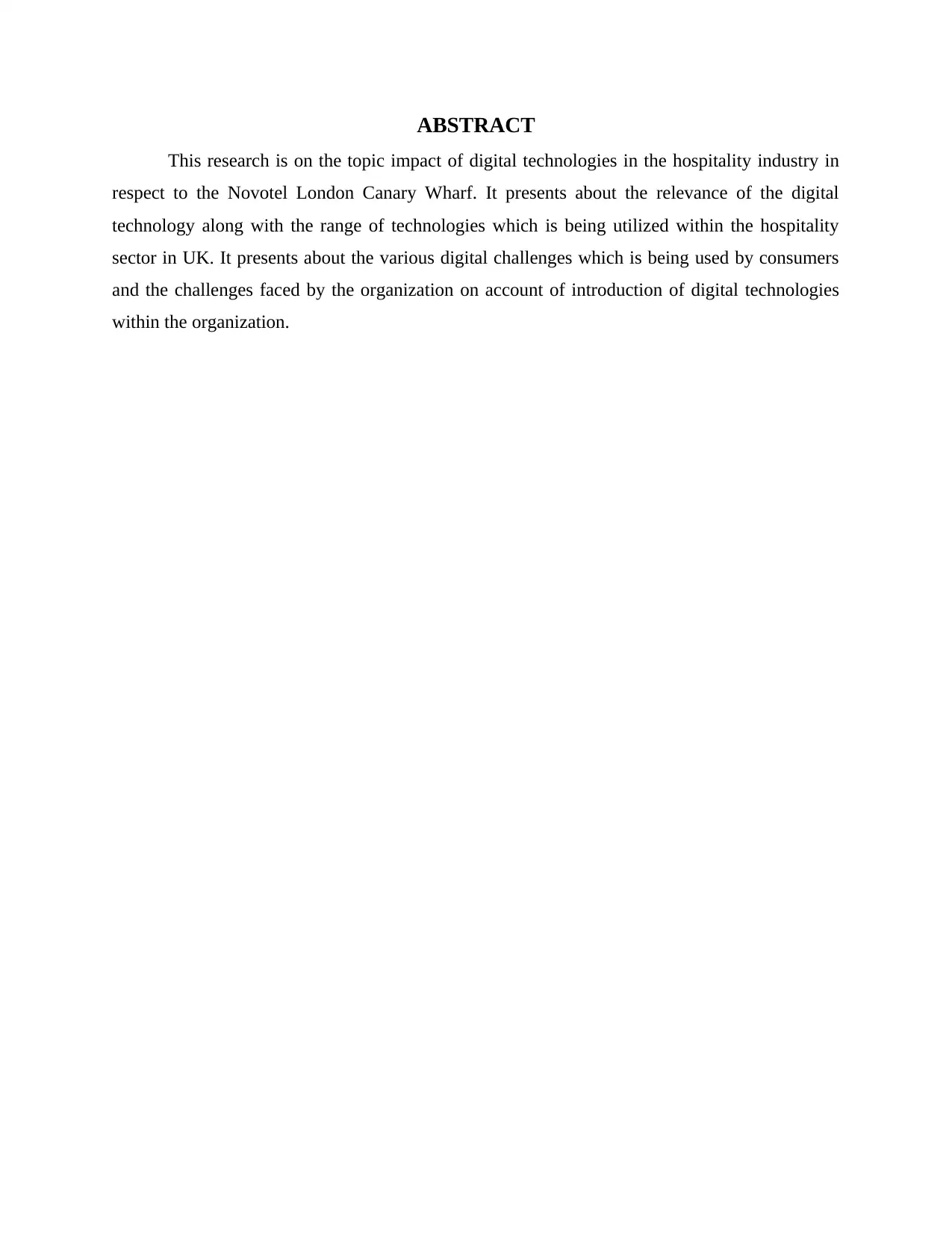
ABSTRACT
This research is on the topic impact of digital technologies in the hospitality industry in
respect to the Novotel London Canary Wharf. It presents about the relevance of the digital
technology along with the range of technologies which is being utilized within the hospitality
sector in UK. It presents about the various digital challenges which is being used by consumers
and the challenges faced by the organization on account of introduction of digital technologies
within the organization.
This research is on the topic impact of digital technologies in the hospitality industry in
respect to the Novotel London Canary Wharf. It presents about the relevance of the digital
technology along with the range of technologies which is being utilized within the hospitality
sector in UK. It presents about the various digital challenges which is being used by consumers
and the challenges faced by the organization on account of introduction of digital technologies
within the organization.
⊘ This is a preview!⊘
Do you want full access?
Subscribe today to unlock all pages.

Trusted by 1+ million students worldwide
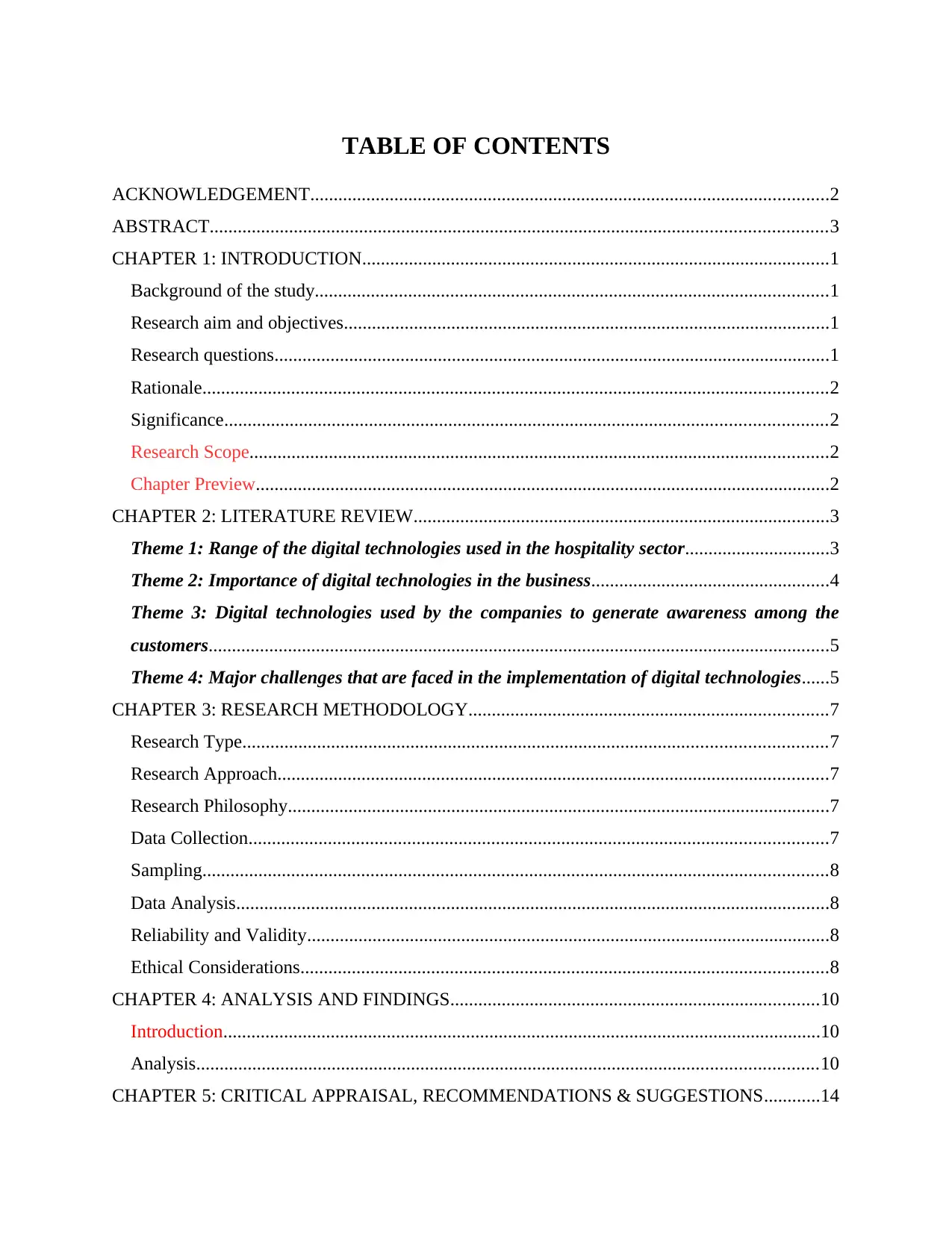
TABLE OF CONTENTS
ACKNOWLEDGEMENT...............................................................................................................2
ABSTRACT....................................................................................................................................3
CHAPTER 1: INTRODUCTION....................................................................................................1
Background of the study..............................................................................................................1
Research aim and objectives........................................................................................................1
Research questions.......................................................................................................................1
Rationale......................................................................................................................................2
Significance.................................................................................................................................2
Research Scope............................................................................................................................2
Chapter Preview...........................................................................................................................2
CHAPTER 2: LITERATURE REVIEW.........................................................................................3
Theme 1: Range of the digital technologies used in the hospitality sector...............................3
Theme 2: Importance of digital technologies in the business...................................................4
Theme 3: Digital technologies used by the companies to generate awareness among the
customers.....................................................................................................................................5
Theme 4: Major challenges that are faced in the implementation of digital technologies......5
CHAPTER 3: RESEARCH METHODOLOGY.............................................................................7
Research Type.............................................................................................................................7
Research Approach......................................................................................................................7
Research Philosophy....................................................................................................................7
Data Collection............................................................................................................................7
Sampling......................................................................................................................................8
Data Analysis...............................................................................................................................8
Reliability and Validity................................................................................................................8
Ethical Considerations.................................................................................................................8
CHAPTER 4: ANALYSIS AND FINDINGS...............................................................................10
Introduction................................................................................................................................10
Analysis.....................................................................................................................................10
CHAPTER 5: CRITICAL APPRAISAL, RECOMMENDATIONS & SUGGESTIONS............14
ACKNOWLEDGEMENT...............................................................................................................2
ABSTRACT....................................................................................................................................3
CHAPTER 1: INTRODUCTION....................................................................................................1
Background of the study..............................................................................................................1
Research aim and objectives........................................................................................................1
Research questions.......................................................................................................................1
Rationale......................................................................................................................................2
Significance.................................................................................................................................2
Research Scope............................................................................................................................2
Chapter Preview...........................................................................................................................2
CHAPTER 2: LITERATURE REVIEW.........................................................................................3
Theme 1: Range of the digital technologies used in the hospitality sector...............................3
Theme 2: Importance of digital technologies in the business...................................................4
Theme 3: Digital technologies used by the companies to generate awareness among the
customers.....................................................................................................................................5
Theme 4: Major challenges that are faced in the implementation of digital technologies......5
CHAPTER 3: RESEARCH METHODOLOGY.............................................................................7
Research Type.............................................................................................................................7
Research Approach......................................................................................................................7
Research Philosophy....................................................................................................................7
Data Collection............................................................................................................................7
Sampling......................................................................................................................................8
Data Analysis...............................................................................................................................8
Reliability and Validity................................................................................................................8
Ethical Considerations.................................................................................................................8
CHAPTER 4: ANALYSIS AND FINDINGS...............................................................................10
Introduction................................................................................................................................10
Analysis.....................................................................................................................................10
CHAPTER 5: CRITICAL APPRAISAL, RECOMMENDATIONS & SUGGESTIONS............14
Paraphrase This Document
Need a fresh take? Get an instant paraphrase of this document with our AI Paraphraser

Interpretation of the results........................................................................................................14
Recommendations......................................................................................................................20
CHAPTER 6: CONCLUSION......................................................................................................22
REFERENCES..............................................................................................................................24
APPENDIX....................................................................................................................................26
Questionnaire.............................................................................................................................26
Recommendations......................................................................................................................20
CHAPTER 6: CONCLUSION......................................................................................................22
REFERENCES..............................................................................................................................24
APPENDIX....................................................................................................................................26
Questionnaire.............................................................................................................................26
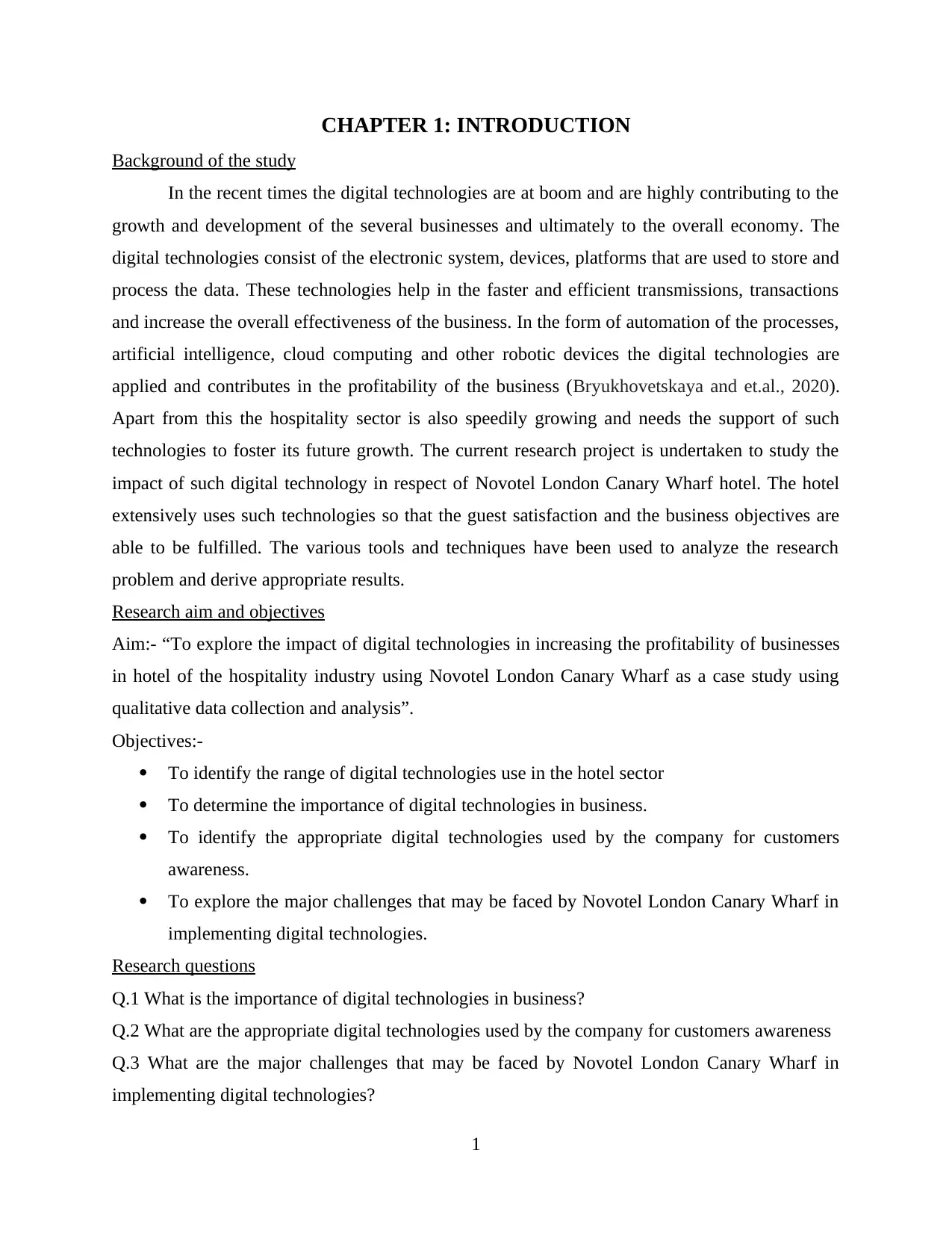
CHAPTER 1: INTRODUCTION
Background of the study
In the recent times the digital technologies are at boom and are highly contributing to the
growth and development of the several businesses and ultimately to the overall economy. The
digital technologies consist of the electronic system, devices, platforms that are used to store and
process the data. These technologies help in the faster and efficient transmissions, transactions
and increase the overall effectiveness of the business. In the form of automation of the processes,
artificial intelligence, cloud computing and other robotic devices the digital technologies are
applied and contributes in the profitability of the business (Bryukhovetskaya and et.al., 2020).
Apart from this the hospitality sector is also speedily growing and needs the support of such
technologies to foster its future growth. The current research project is undertaken to study the
impact of such digital technology in respect of Novotel London Canary Wharf hotel. The hotel
extensively uses such technologies so that the guest satisfaction and the business objectives are
able to be fulfilled. The various tools and techniques have been used to analyze the research
problem and derive appropriate results.
Research aim and objectives
Aim:- “To explore the impact of digital technologies in increasing the profitability of businesses
in hotel of the hospitality industry using Novotel London Canary Wharf as a case study using
qualitative data collection and analysis”.
Objectives:-
To identify the range of digital technologies use in the hotel sector
To determine the importance of digital technologies in business.
To identify the appropriate digital technologies used by the company for customers
awareness.
To explore the major challenges that may be faced by Novotel London Canary Wharf in
implementing digital technologies.
Research questions
Q.1 What is the importance of digital technologies in business?
Q.2 What are the appropriate digital technologies used by the company for customers awareness
Q.3 What are the major challenges that may be faced by Novotel London Canary Wharf in
implementing digital technologies?
1
Background of the study
In the recent times the digital technologies are at boom and are highly contributing to the
growth and development of the several businesses and ultimately to the overall economy. The
digital technologies consist of the electronic system, devices, platforms that are used to store and
process the data. These technologies help in the faster and efficient transmissions, transactions
and increase the overall effectiveness of the business. In the form of automation of the processes,
artificial intelligence, cloud computing and other robotic devices the digital technologies are
applied and contributes in the profitability of the business (Bryukhovetskaya and et.al., 2020).
Apart from this the hospitality sector is also speedily growing and needs the support of such
technologies to foster its future growth. The current research project is undertaken to study the
impact of such digital technology in respect of Novotel London Canary Wharf hotel. The hotel
extensively uses such technologies so that the guest satisfaction and the business objectives are
able to be fulfilled. The various tools and techniques have been used to analyze the research
problem and derive appropriate results.
Research aim and objectives
Aim:- “To explore the impact of digital technologies in increasing the profitability of businesses
in hotel of the hospitality industry using Novotel London Canary Wharf as a case study using
qualitative data collection and analysis”.
Objectives:-
To identify the range of digital technologies use in the hotel sector
To determine the importance of digital technologies in business.
To identify the appropriate digital technologies used by the company for customers
awareness.
To explore the major challenges that may be faced by Novotel London Canary Wharf in
implementing digital technologies.
Research questions
Q.1 What is the importance of digital technologies in business?
Q.2 What are the appropriate digital technologies used by the company for customers awareness
Q.3 What are the major challenges that may be faced by Novotel London Canary Wharf in
implementing digital technologies?
1
⊘ This is a preview!⊘
Do you want full access?
Subscribe today to unlock all pages.

Trusted by 1+ million students worldwide
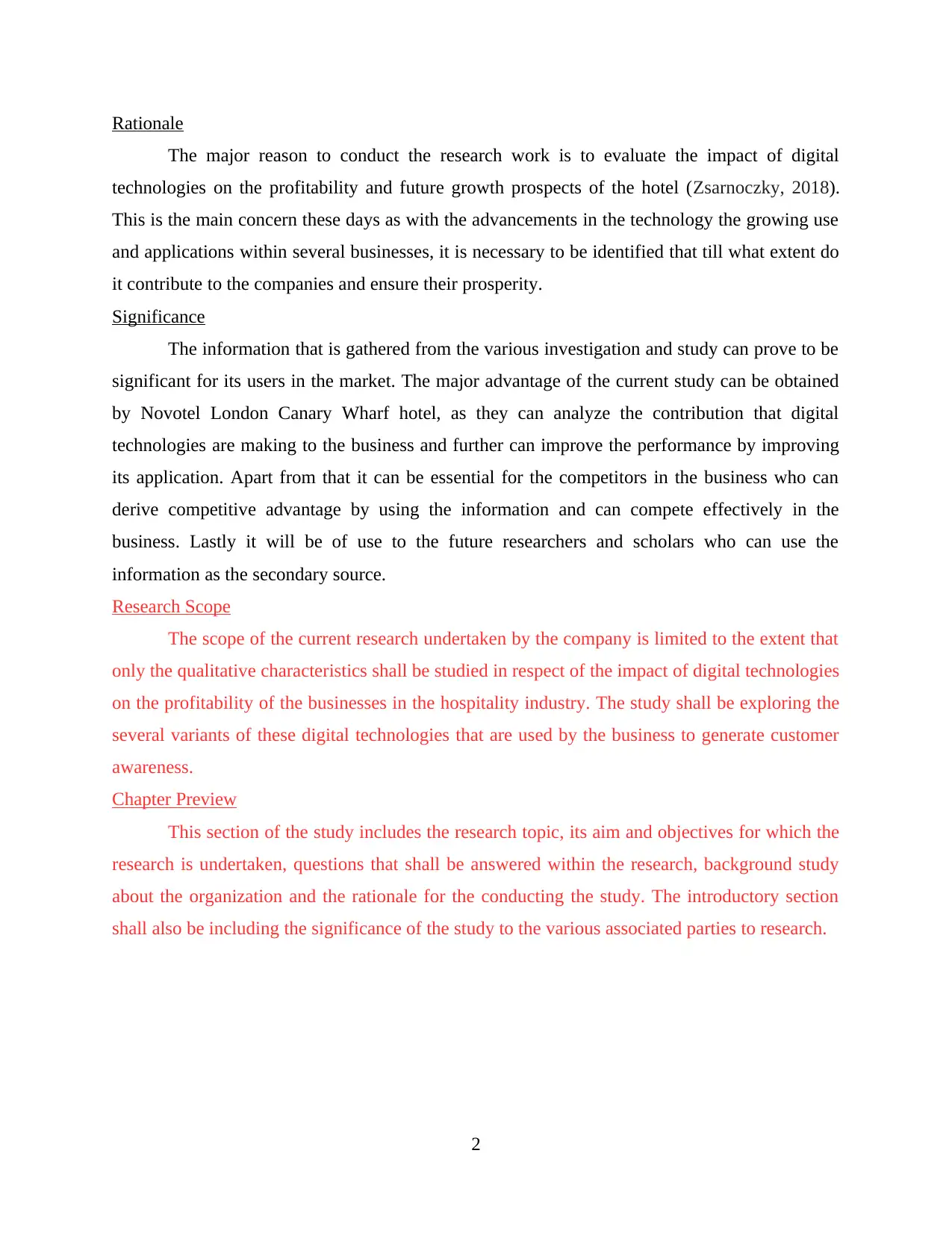
Rationale
The major reason to conduct the research work is to evaluate the impact of digital
technologies on the profitability and future growth prospects of the hotel (Zsarnoczky, 2018).
This is the main concern these days as with the advancements in the technology the growing use
and applications within several businesses, it is necessary to be identified that till what extent do
it contribute to the companies and ensure their prosperity.
Significance
The information that is gathered from the various investigation and study can prove to be
significant for its users in the market. The major advantage of the current study can be obtained
by Novotel London Canary Wharf hotel, as they can analyze the contribution that digital
technologies are making to the business and further can improve the performance by improving
its application. Apart from that it can be essential for the competitors in the business who can
derive competitive advantage by using the information and can compete effectively in the
business. Lastly it will be of use to the future researchers and scholars who can use the
information as the secondary source.
Research Scope
The scope of the current research undertaken by the company is limited to the extent that
only the qualitative characteristics shall be studied in respect of the impact of digital technologies
on the profitability of the businesses in the hospitality industry. The study shall be exploring the
several variants of these digital technologies that are used by the business to generate customer
awareness.
Chapter Preview
This section of the study includes the research topic, its aim and objectives for which the
research is undertaken, questions that shall be answered within the research, background study
about the organization and the rationale for the conducting the study. The introductory section
shall also be including the significance of the study to the various associated parties to research.
2
The major reason to conduct the research work is to evaluate the impact of digital
technologies on the profitability and future growth prospects of the hotel (Zsarnoczky, 2018).
This is the main concern these days as with the advancements in the technology the growing use
and applications within several businesses, it is necessary to be identified that till what extent do
it contribute to the companies and ensure their prosperity.
Significance
The information that is gathered from the various investigation and study can prove to be
significant for its users in the market. The major advantage of the current study can be obtained
by Novotel London Canary Wharf hotel, as they can analyze the contribution that digital
technologies are making to the business and further can improve the performance by improving
its application. Apart from that it can be essential for the competitors in the business who can
derive competitive advantage by using the information and can compete effectively in the
business. Lastly it will be of use to the future researchers and scholars who can use the
information as the secondary source.
Research Scope
The scope of the current research undertaken by the company is limited to the extent that
only the qualitative characteristics shall be studied in respect of the impact of digital technologies
on the profitability of the businesses in the hospitality industry. The study shall be exploring the
several variants of these digital technologies that are used by the business to generate customer
awareness.
Chapter Preview
This section of the study includes the research topic, its aim and objectives for which the
research is undertaken, questions that shall be answered within the research, background study
about the organization and the rationale for the conducting the study. The introductory section
shall also be including the significance of the study to the various associated parties to research.
2
Paraphrase This Document
Need a fresh take? Get an instant paraphrase of this document with our AI Paraphraser
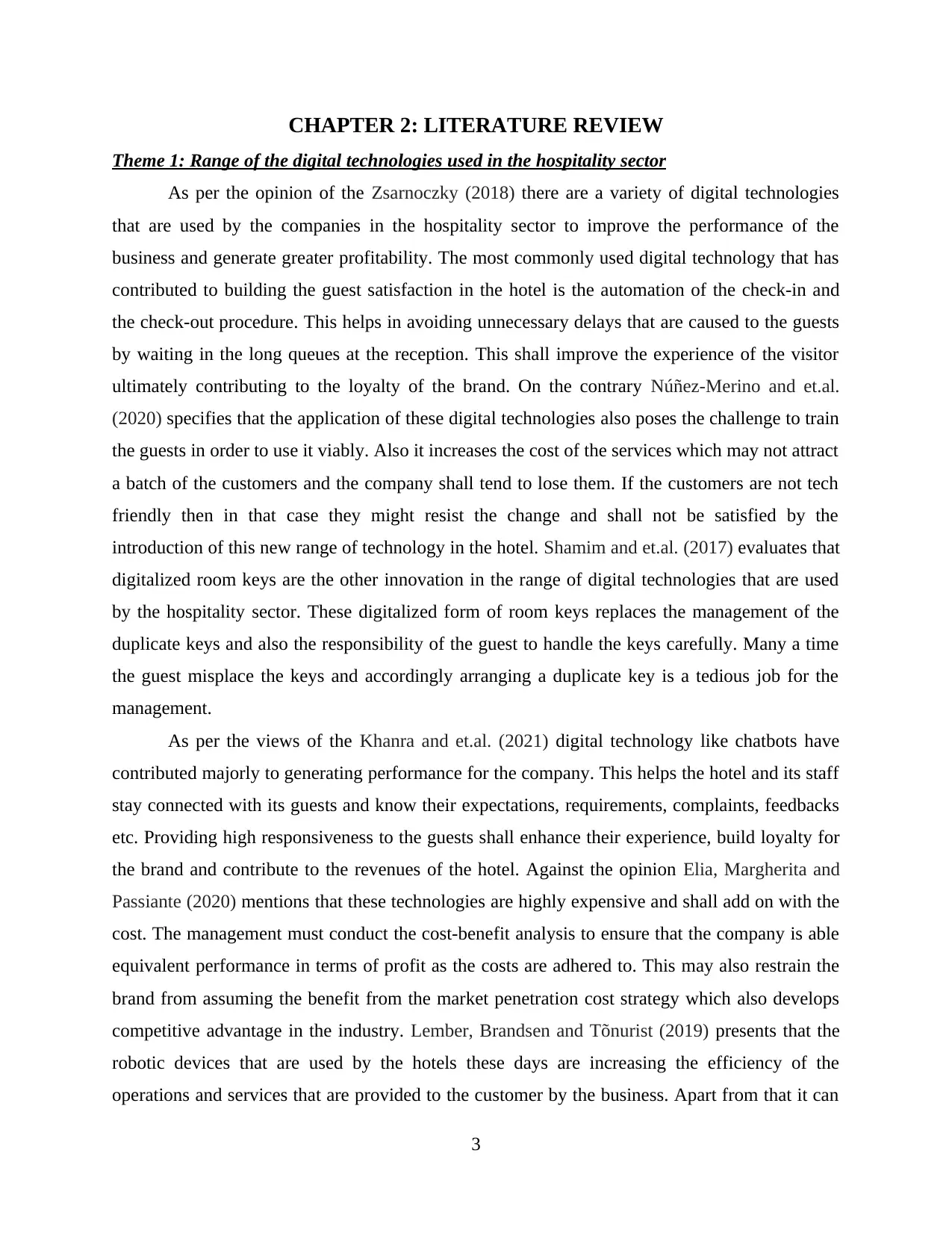
CHAPTER 2: LITERATURE REVIEW
Theme 1: Range of the digital technologies used in the hospitality sector
As per the opinion of the Zsarnoczky (2018) there are a variety of digital technologies
that are used by the companies in the hospitality sector to improve the performance of the
business and generate greater profitability. The most commonly used digital technology that has
contributed to building the guest satisfaction in the hotel is the automation of the check-in and
the check-out procedure. This helps in avoiding unnecessary delays that are caused to the guests
by waiting in the long queues at the reception. This shall improve the experience of the visitor
ultimately contributing to the loyalty of the brand. On the contrary Núñez-Merino and et.al.
(2020) specifies that the application of these digital technologies also poses the challenge to train
the guests in order to use it viably. Also it increases the cost of the services which may not attract
a batch of the customers and the company shall tend to lose them. If the customers are not tech
friendly then in that case they might resist the change and shall not be satisfied by the
introduction of this new range of technology in the hotel. Shamim and et.al. (2017) evaluates that
digitalized room keys are the other innovation in the range of digital technologies that are used
by the hospitality sector. These digitalized form of room keys replaces the management of the
duplicate keys and also the responsibility of the guest to handle the keys carefully. Many a time
the guest misplace the keys and accordingly arranging a duplicate key is a tedious job for the
management.
As per the views of the Khanra and et.al. (2021) digital technology like chatbots have
contributed majorly to generating performance for the company. This helps the hotel and its staff
stay connected with its guests and know their expectations, requirements, complaints, feedbacks
etc. Providing high responsiveness to the guests shall enhance their experience, build loyalty for
the brand and contribute to the revenues of the hotel. Against the opinion Elia, Margherita and
Passiante (2020) mentions that these technologies are highly expensive and shall add on with the
cost. The management must conduct the cost-benefit analysis to ensure that the company is able
equivalent performance in terms of profit as the costs are adhered to. This may also restrain the
brand from assuming the benefit from the market penetration cost strategy which also develops
competitive advantage in the industry. Lember, Brandsen and Tõnurist (2019) presents that the
robotic devices that are used by the hotels these days are increasing the efficiency of the
operations and services that are provided to the customer by the business. Apart from that it can
3
Theme 1: Range of the digital technologies used in the hospitality sector
As per the opinion of the Zsarnoczky (2018) there are a variety of digital technologies
that are used by the companies in the hospitality sector to improve the performance of the
business and generate greater profitability. The most commonly used digital technology that has
contributed to building the guest satisfaction in the hotel is the automation of the check-in and
the check-out procedure. This helps in avoiding unnecessary delays that are caused to the guests
by waiting in the long queues at the reception. This shall improve the experience of the visitor
ultimately contributing to the loyalty of the brand. On the contrary Núñez-Merino and et.al.
(2020) specifies that the application of these digital technologies also poses the challenge to train
the guests in order to use it viably. Also it increases the cost of the services which may not attract
a batch of the customers and the company shall tend to lose them. If the customers are not tech
friendly then in that case they might resist the change and shall not be satisfied by the
introduction of this new range of technology in the hotel. Shamim and et.al. (2017) evaluates that
digitalized room keys are the other innovation in the range of digital technologies that are used
by the hospitality sector. These digitalized form of room keys replaces the management of the
duplicate keys and also the responsibility of the guest to handle the keys carefully. Many a time
the guest misplace the keys and accordingly arranging a duplicate key is a tedious job for the
management.
As per the views of the Khanra and et.al. (2021) digital technology like chatbots have
contributed majorly to generating performance for the company. This helps the hotel and its staff
stay connected with its guests and know their expectations, requirements, complaints, feedbacks
etc. Providing high responsiveness to the guests shall enhance their experience, build loyalty for
the brand and contribute to the revenues of the hotel. Against the opinion Elia, Margherita and
Passiante (2020) mentions that these technologies are highly expensive and shall add on with the
cost. The management must conduct the cost-benefit analysis to ensure that the company is able
equivalent performance in terms of profit as the costs are adhered to. This may also restrain the
brand from assuming the benefit from the market penetration cost strategy which also develops
competitive advantage in the industry. Lember, Brandsen and Tõnurist (2019) presents that the
robotic devices that are used by the hotels these days are increasing the efficiency of the
operations and services that are provided to the customer by the business. Apart from that it can
3
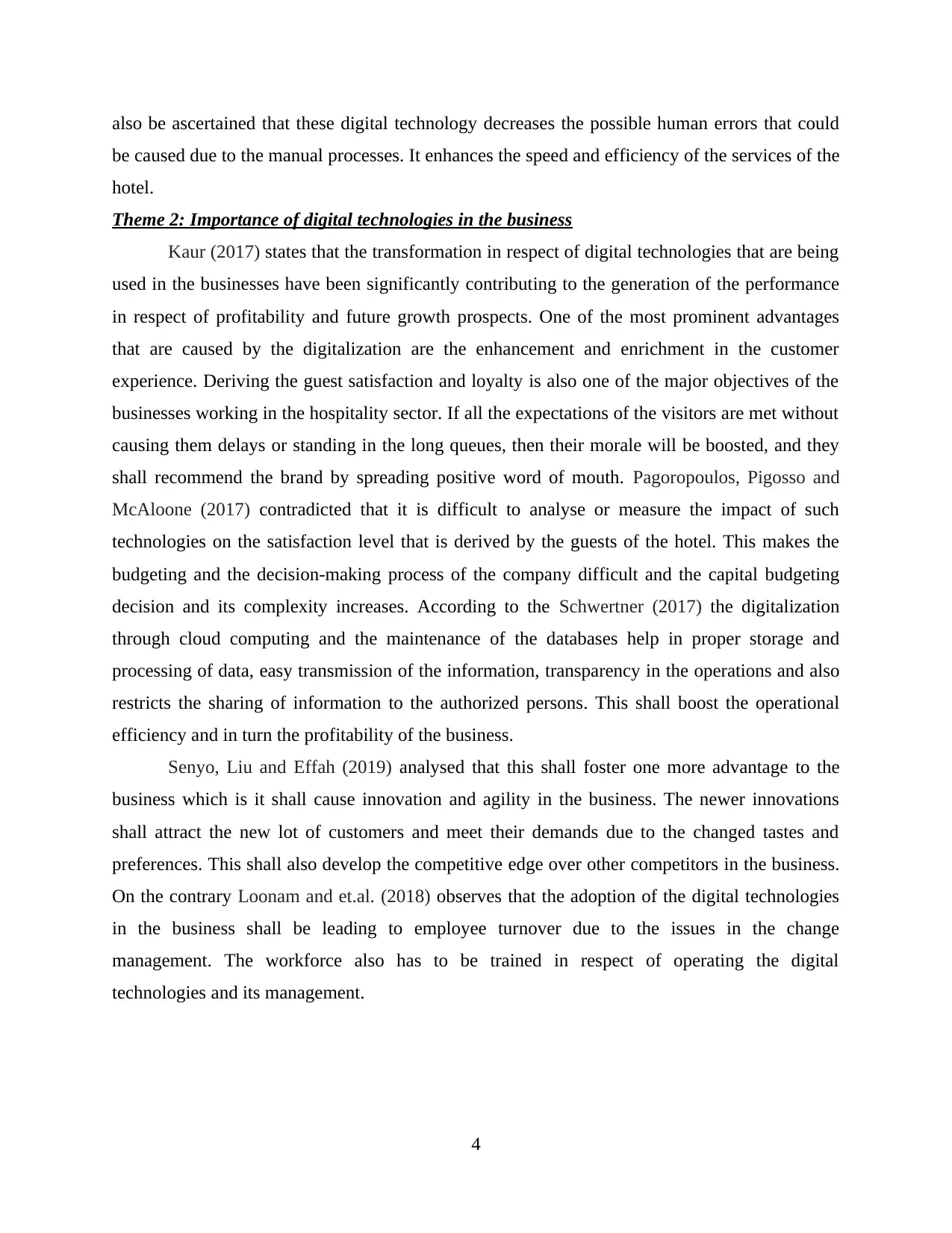
also be ascertained that these digital technology decreases the possible human errors that could
be caused due to the manual processes. It enhances the speed and efficiency of the services of the
hotel.
Theme 2: Importance of digital technologies in the business
Kaur (2017) states that the transformation in respect of digital technologies that are being
used in the businesses have been significantly contributing to the generation of the performance
in respect of profitability and future growth prospects. One of the most prominent advantages
that are caused by the digitalization are the enhancement and enrichment in the customer
experience. Deriving the guest satisfaction and loyalty is also one of the major objectives of the
businesses working in the hospitality sector. If all the expectations of the visitors are met without
causing them delays or standing in the long queues, then their morale will be boosted, and they
shall recommend the brand by spreading positive word of mouth. Pagoropoulos, Pigosso and
McAloone (2017) contradicted that it is difficult to analyse or measure the impact of such
technologies on the satisfaction level that is derived by the guests of the hotel. This makes the
budgeting and the decision-making process of the company difficult and the capital budgeting
decision and its complexity increases. According to the Schwertner (2017) the digitalization
through cloud computing and the maintenance of the databases help in proper storage and
processing of data, easy transmission of the information, transparency in the operations and also
restricts the sharing of information to the authorized persons. This shall boost the operational
efficiency and in turn the profitability of the business.
Senyo, Liu and Effah (2019) analysed that this shall foster one more advantage to the
business which is it shall cause innovation and agility in the business. The newer innovations
shall attract the new lot of customers and meet their demands due to the changed tastes and
preferences. This shall also develop the competitive edge over other competitors in the business.
On the contrary Loonam and et.al. (2018) observes that the adoption of the digital technologies
in the business shall be leading to employee turnover due to the issues in the change
management. The workforce also has to be trained in respect of operating the digital
technologies and its management.
4
be caused due to the manual processes. It enhances the speed and efficiency of the services of the
hotel.
Theme 2: Importance of digital technologies in the business
Kaur (2017) states that the transformation in respect of digital technologies that are being
used in the businesses have been significantly contributing to the generation of the performance
in respect of profitability and future growth prospects. One of the most prominent advantages
that are caused by the digitalization are the enhancement and enrichment in the customer
experience. Deriving the guest satisfaction and loyalty is also one of the major objectives of the
businesses working in the hospitality sector. If all the expectations of the visitors are met without
causing them delays or standing in the long queues, then their morale will be boosted, and they
shall recommend the brand by spreading positive word of mouth. Pagoropoulos, Pigosso and
McAloone (2017) contradicted that it is difficult to analyse or measure the impact of such
technologies on the satisfaction level that is derived by the guests of the hotel. This makes the
budgeting and the decision-making process of the company difficult and the capital budgeting
decision and its complexity increases. According to the Schwertner (2017) the digitalization
through cloud computing and the maintenance of the databases help in proper storage and
processing of data, easy transmission of the information, transparency in the operations and also
restricts the sharing of information to the authorized persons. This shall boost the operational
efficiency and in turn the profitability of the business.
Senyo, Liu and Effah (2019) analysed that this shall foster one more advantage to the
business which is it shall cause innovation and agility in the business. The newer innovations
shall attract the new lot of customers and meet their demands due to the changed tastes and
preferences. This shall also develop the competitive edge over other competitors in the business.
On the contrary Loonam and et.al. (2018) observes that the adoption of the digital technologies
in the business shall be leading to employee turnover due to the issues in the change
management. The workforce also has to be trained in respect of operating the digital
technologies and its management.
4
⊘ This is a preview!⊘
Do you want full access?
Subscribe today to unlock all pages.

Trusted by 1+ million students worldwide
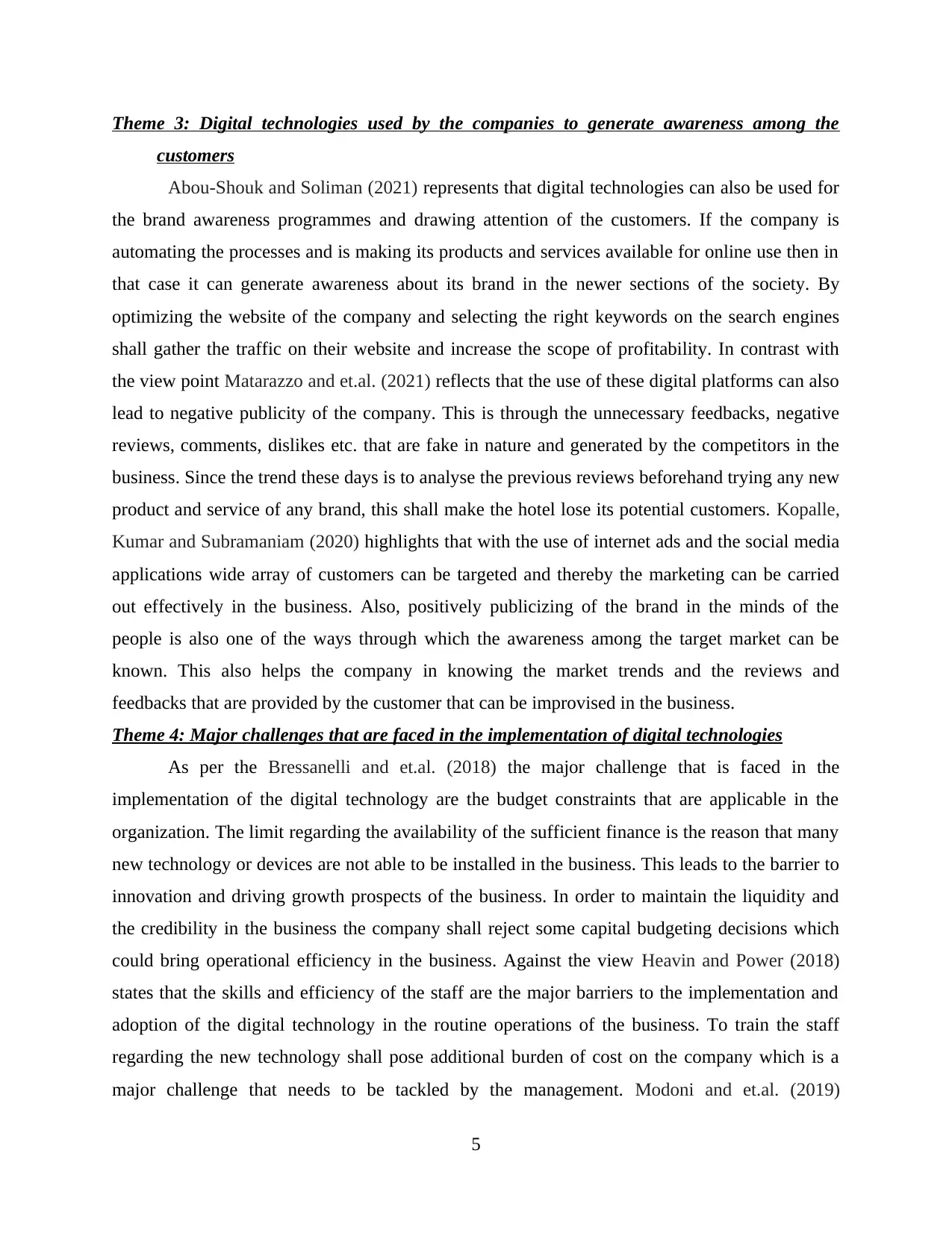
Theme 3: Digital technologies used by the companies to generate awareness among the
customers
Abou-Shouk and Soliman (2021) represents that digital technologies can also be used for
the brand awareness programmes and drawing attention of the customers. If the company is
automating the processes and is making its products and services available for online use then in
that case it can generate awareness about its brand in the newer sections of the society. By
optimizing the website of the company and selecting the right keywords on the search engines
shall gather the traffic on their website and increase the scope of profitability. In contrast with
the view point Matarazzo and et.al. (2021) reflects that the use of these digital platforms can also
lead to negative publicity of the company. This is through the unnecessary feedbacks, negative
reviews, comments, dislikes etc. that are fake in nature and generated by the competitors in the
business. Since the trend these days is to analyse the previous reviews beforehand trying any new
product and service of any brand, this shall make the hotel lose its potential customers. Kopalle,
Kumar and Subramaniam (2020) highlights that with the use of internet ads and the social media
applications wide array of customers can be targeted and thereby the marketing can be carried
out effectively in the business. Also, positively publicizing of the brand in the minds of the
people is also one of the ways through which the awareness among the target market can be
known. This also helps the company in knowing the market trends and the reviews and
feedbacks that are provided by the customer that can be improvised in the business.
Theme 4: Major challenges that are faced in the implementation of digital technologies
As per the Bressanelli and et.al. (2018) the major challenge that is faced in the
implementation of the digital technology are the budget constraints that are applicable in the
organization. The limit regarding the availability of the sufficient finance is the reason that many
new technology or devices are not able to be installed in the business. This leads to the barrier to
innovation and driving growth prospects of the business. In order to maintain the liquidity and
the credibility in the business the company shall reject some capital budgeting decisions which
could bring operational efficiency in the business. Against the view Heavin and Power (2018)
states that the skills and efficiency of the staff are the major barriers to the implementation and
adoption of the digital technology in the routine operations of the business. To train the staff
regarding the new technology shall pose additional burden of cost on the company which is a
major challenge that needs to be tackled by the management. Modoni and et.al. (2019)
5
customers
Abou-Shouk and Soliman (2021) represents that digital technologies can also be used for
the brand awareness programmes and drawing attention of the customers. If the company is
automating the processes and is making its products and services available for online use then in
that case it can generate awareness about its brand in the newer sections of the society. By
optimizing the website of the company and selecting the right keywords on the search engines
shall gather the traffic on their website and increase the scope of profitability. In contrast with
the view point Matarazzo and et.al. (2021) reflects that the use of these digital platforms can also
lead to negative publicity of the company. This is through the unnecessary feedbacks, negative
reviews, comments, dislikes etc. that are fake in nature and generated by the competitors in the
business. Since the trend these days is to analyse the previous reviews beforehand trying any new
product and service of any brand, this shall make the hotel lose its potential customers. Kopalle,
Kumar and Subramaniam (2020) highlights that with the use of internet ads and the social media
applications wide array of customers can be targeted and thereby the marketing can be carried
out effectively in the business. Also, positively publicizing of the brand in the minds of the
people is also one of the ways through which the awareness among the target market can be
known. This also helps the company in knowing the market trends and the reviews and
feedbacks that are provided by the customer that can be improvised in the business.
Theme 4: Major challenges that are faced in the implementation of digital technologies
As per the Bressanelli and et.al. (2018) the major challenge that is faced in the
implementation of the digital technology are the budget constraints that are applicable in the
organization. The limit regarding the availability of the sufficient finance is the reason that many
new technology or devices are not able to be installed in the business. This leads to the barrier to
innovation and driving growth prospects of the business. In order to maintain the liquidity and
the credibility in the business the company shall reject some capital budgeting decisions which
could bring operational efficiency in the business. Against the view Heavin and Power (2018)
states that the skills and efficiency of the staff are the major barriers to the implementation and
adoption of the digital technology in the routine operations of the business. To train the staff
regarding the new technology shall pose additional burden of cost on the company which is a
major challenge that needs to be tackled by the management. Modoni and et.al. (2019)
5
Paraphrase This Document
Need a fresh take? Get an instant paraphrase of this document with our AI Paraphraser
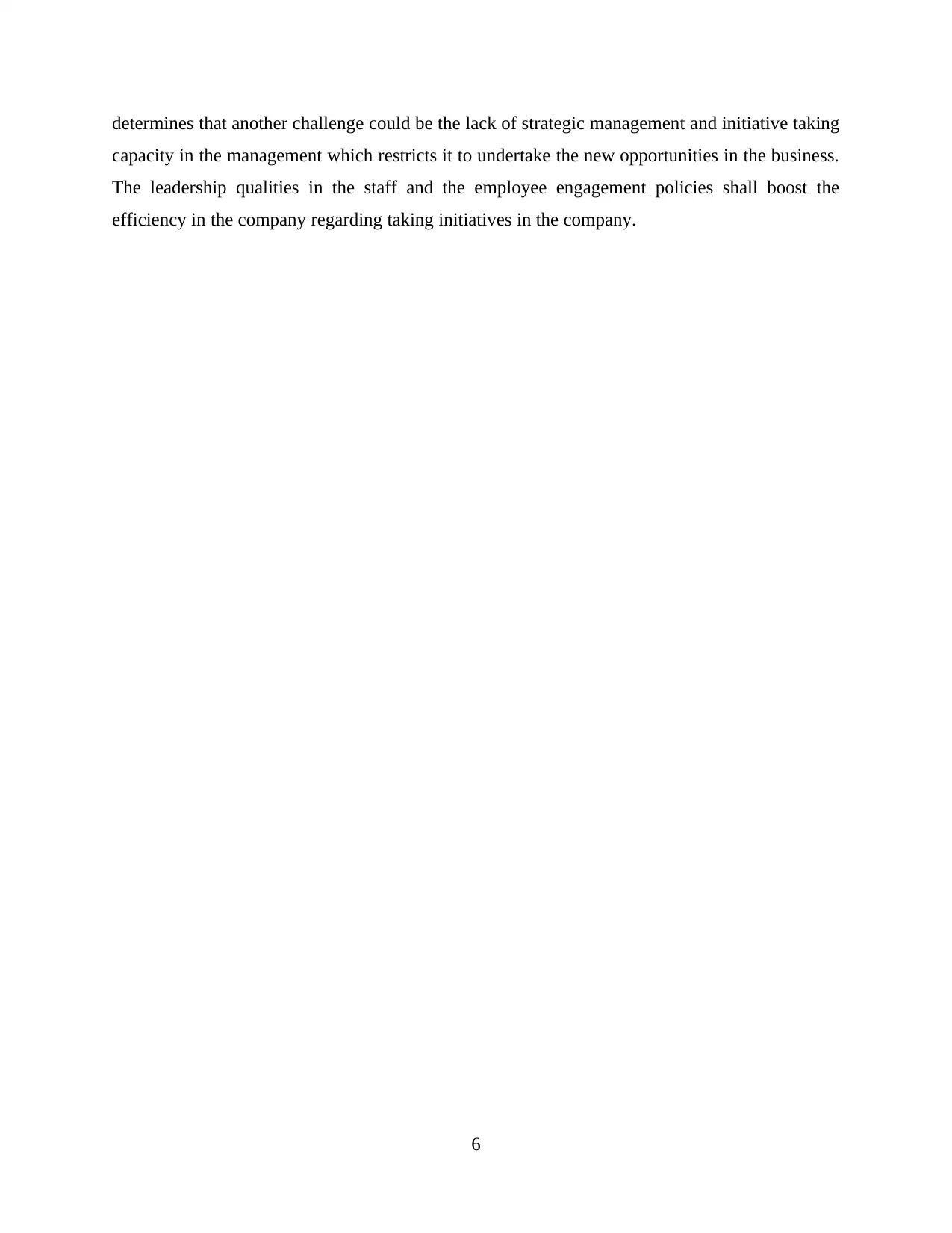
determines that another challenge could be the lack of strategic management and initiative taking
capacity in the management which restricts it to undertake the new opportunities in the business.
The leadership qualities in the staff and the employee engagement policies shall boost the
efficiency in the company regarding taking initiatives in the company.
6
capacity in the management which restricts it to undertake the new opportunities in the business.
The leadership qualities in the staff and the employee engagement policies shall boost the
efficiency in the company regarding taking initiatives in the company.
6
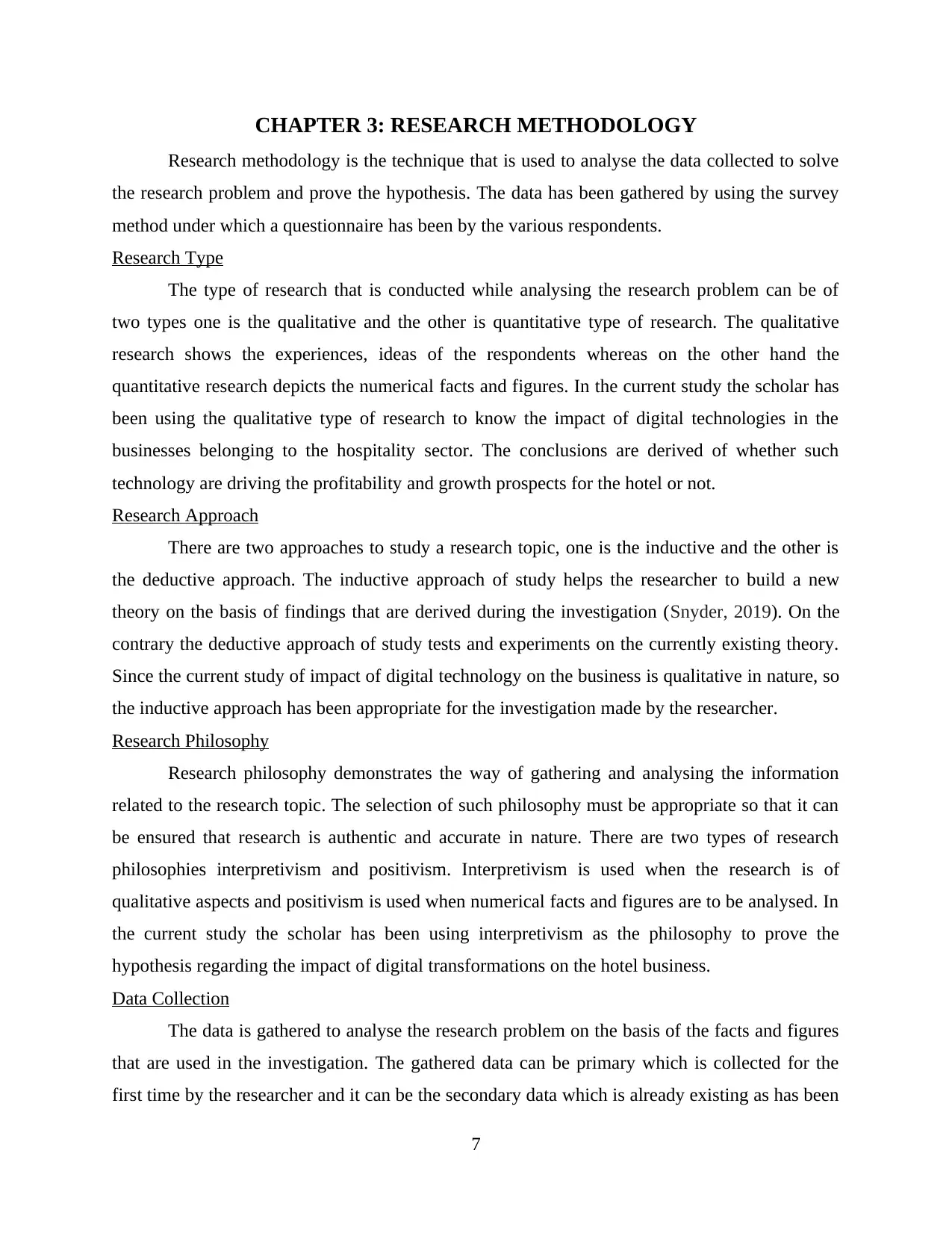
CHAPTER 3: RESEARCH METHODOLOGY
Research methodology is the technique that is used to analyse the data collected to solve
the research problem and prove the hypothesis. The data has been gathered by using the survey
method under which a questionnaire has been by the various respondents.
Research Type
The type of research that is conducted while analysing the research problem can be of
two types one is the qualitative and the other is quantitative type of research. The qualitative
research shows the experiences, ideas of the respondents whereas on the other hand the
quantitative research depicts the numerical facts and figures. In the current study the scholar has
been using the qualitative type of research to know the impact of digital technologies in the
businesses belonging to the hospitality sector. The conclusions are derived of whether such
technology are driving the profitability and growth prospects for the hotel or not.
Research Approach
There are two approaches to study a research topic, one is the inductive and the other is
the deductive approach. The inductive approach of study helps the researcher to build a new
theory on the basis of findings that are derived during the investigation (Snyder, 2019). On the
contrary the deductive approach of study tests and experiments on the currently existing theory.
Since the current study of impact of digital technology on the business is qualitative in nature, so
the inductive approach has been appropriate for the investigation made by the researcher.
Research Philosophy
Research philosophy demonstrates the way of gathering and analysing the information
related to the research topic. The selection of such philosophy must be appropriate so that it can
be ensured that research is authentic and accurate in nature. There are two types of research
philosophies interpretivism and positivism. Interpretivism is used when the research is of
qualitative aspects and positivism is used when numerical facts and figures are to be analysed. In
the current study the scholar has been using interpretivism as the philosophy to prove the
hypothesis regarding the impact of digital transformations on the hotel business.
Data Collection
The data is gathered to analyse the research problem on the basis of the facts and figures
that are used in the investigation. The gathered data can be primary which is collected for the
first time by the researcher and it can be the secondary data which is already existing as has been
7
Research methodology is the technique that is used to analyse the data collected to solve
the research problem and prove the hypothesis. The data has been gathered by using the survey
method under which a questionnaire has been by the various respondents.
Research Type
The type of research that is conducted while analysing the research problem can be of
two types one is the qualitative and the other is quantitative type of research. The qualitative
research shows the experiences, ideas of the respondents whereas on the other hand the
quantitative research depicts the numerical facts and figures. In the current study the scholar has
been using the qualitative type of research to know the impact of digital technologies in the
businesses belonging to the hospitality sector. The conclusions are derived of whether such
technology are driving the profitability and growth prospects for the hotel or not.
Research Approach
There are two approaches to study a research topic, one is the inductive and the other is
the deductive approach. The inductive approach of study helps the researcher to build a new
theory on the basis of findings that are derived during the investigation (Snyder, 2019). On the
contrary the deductive approach of study tests and experiments on the currently existing theory.
Since the current study of impact of digital technology on the business is qualitative in nature, so
the inductive approach has been appropriate for the investigation made by the researcher.
Research Philosophy
Research philosophy demonstrates the way of gathering and analysing the information
related to the research topic. The selection of such philosophy must be appropriate so that it can
be ensured that research is authentic and accurate in nature. There are two types of research
philosophies interpretivism and positivism. Interpretivism is used when the research is of
qualitative aspects and positivism is used when numerical facts and figures are to be analysed. In
the current study the scholar has been using interpretivism as the philosophy to prove the
hypothesis regarding the impact of digital transformations on the hotel business.
Data Collection
The data is gathered to analyse the research problem on the basis of the facts and figures
that are used in the investigation. The gathered data can be primary which is collected for the
first time by the researcher and it can be the secondary data which is already existing as has been
7
⊘ This is a preview!⊘
Do you want full access?
Subscribe today to unlock all pages.

Trusted by 1+ million students worldwide
1 out of 33
Related Documents
Your All-in-One AI-Powered Toolkit for Academic Success.
+13062052269
info@desklib.com
Available 24*7 on WhatsApp / Email
![[object Object]](/_next/static/media/star-bottom.7253800d.svg)
Unlock your academic potential
Copyright © 2020–2026 A2Z Services. All Rights Reserved. Developed and managed by ZUCOL.




